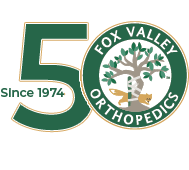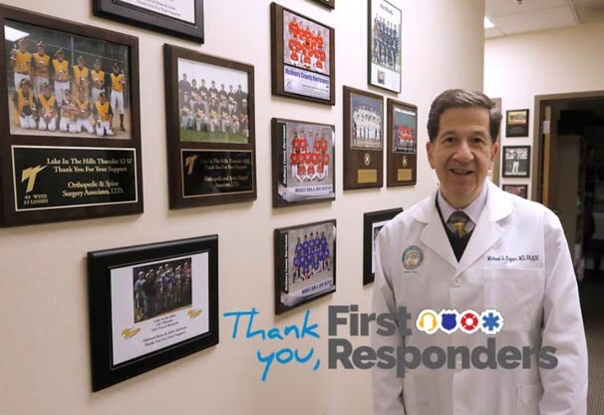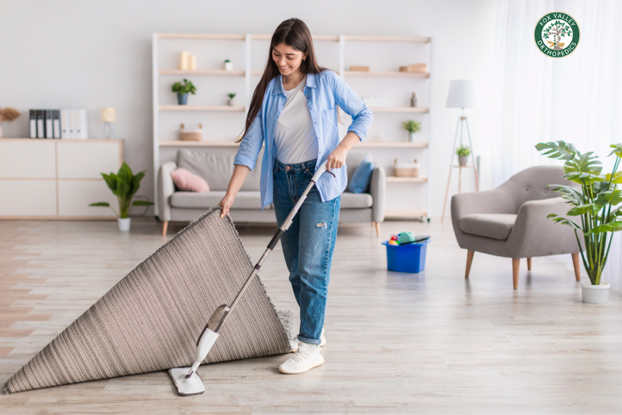What’s the Difference Between Tennis Elbow & Golfer’s Elbow?
- Category: Blog
- Posted On:
Read our blog to learn more about the two common overuse injuries called tennis elbow and golfer’s elbow. Contact us at Fox Valley Orthopedics for an appointment.
What’s the Difference Between Tennis Elbow & Golfer’s Elbow?
As two of the most common overuse injuries of the forearms, tennis elbow and golfer’s elbow have similar causes but they are distinct conditions. Tennis elbow, medically known as lateral epicondylitis, causes pain in the outer part of the elbow, and golfer’s elbow (medial epicondylitis) affects the inside of the elbow. Neither condition, despite their names, are exclusive to tennis or golfers, respectively, although they are common among athletes who play those sports. In fact, tennis players can get golfer’s elbow and vice versa – just as the opposite is true, as well – and it is not uncommon.
Do I Have Tennis Elbow?
Tennis players and other athletes who play racquet sports are highly susceptible to tennis elbow simply because they repetitively swing their racquets to hit balls across the court over and over. The repetitive arm, elbow, and wrist work resulting from the constant hitting and swinging motions and repeated contractions of the forearm muscles used to straighten and raise the hand and wrist damages these muscles and tendons and causes the overuse injury. The result is degeneration and tears causing pain, tenderness, and elbow joint weakness.
Symptoms of tennis elbow may include but are not limited to:
- Pain: Mild elbow pain that intensifies to a burning pain in days or weeks following the incident that caused the injury (if you know the cause)
- Weakness: You may notice you have difficulty gripping objects, shaking hands with others, or turning doorknobs, among other things
- Stiffness: The affected arm may feel not only weak, but stiff and sore when you extend it or try to bend your arm
You may have tennis elbow if you have a profession that requires repetitive upper-extremity motions, such as a plumber, painter, musician, carpenter, assembly-line worker, line cook, or something else of a similar nature.
Do I Have Golfer’s Elbow?
Golfer’s elbow is not only something that affects golfers, but anyone who participates in athletics requiring repetitive gripping motions like throwing or swinging. Other athletes who are susceptible to it include baseball pitchers, rock climbers, weightlifters, and javelin throwers. However, as mentioned above with tennis elbow, golfer’s elbow is not exclusive to athletes, either. People whose work involves grip strength may also be prone to developing overuse injuries like golfer’s elbow,
Symptoms of golfer’s elbow may take weeks or months to develop, but you may notice the following signs or symptoms:
- Pain: Your forearm or wrist will ache, especially while trying to make a fist, and usually pain is worse in the morning
- Weakness: Your grip strength will be adversely affected in the arm that is injured
You may be afflicted with golfer’s elbow if you do things such as lift loaded food trays, hammer nails, or type at a keyboard daily. Any repeated use of the wrist and arm to bend, grasp, or twist things can lead to golfer’s elbow as the tendons develop tiny tears that lead to its symptoms.
Forearm Pain? Consult with Fox Valley Orthopedics for a Diagnosis
Are you still unsure about whether your pain is due to tennis elbow or golfer’s elbow, or are you looking for effective, preferably nonsurgical treatments? The good news is that surgery is only rarely necessary for either tennis or golfer’s elbow except in the direst cases, and even then, that is typically only for cases when the patient hasn’t sought treatment for a very extended period and has suffered with the pain during that time. Don’t let that happen to you – Fox Valley Orthopedics can help. Our board-certified orthopedic doctors are standing by to help you heal.
To schedule an appointment with Fox Valley Orthopedics, please contact us today at (630) 584-1400 or reach out online now.


